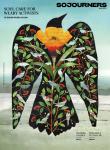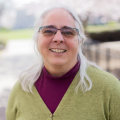I LOVE WORDS. I love etymological dictionaries packed with word genealogies. I love that apricot is a cousin to precocious, kitchen, and charcuterie. That the word word (from the Old English) is rooted in utterance and promise, in the theological sense. As in, to give one’s word.
Words spoken are different creatures than words written. Christians designated written words as more trustworthy than oral composition, but early Judaism prioritized oral transmission of sacred words — as many Indigenous communities do still. But written words (like these) can be controlled and manipulated. Writing prevents the breathed utterance from passing through the orator’s flesh to be inhaled by the communal body. Orality is to literacy as wildfire is to candle flame.
Maybe that is why I moved heaven and earth in 2000 to hear Irish poet Seamus Heaney read in person, accompanied by Liam O’Flynn on the uilleann pipes. Having studied Heaney’s written word, especially the collection Station Island, I wanted to hear the man himself, to hear him orate (from the roots of utter and praise before an assembly). I wanted to inhale his language (tribal and tongue).
Heaney read from his own translation of Brian Merriman’s scathingly hilarious 18th-century send-up, “The Midnight Court,” in which the women of Ireland put their men on trial for becoming a “spunkless generation.” Heaney’s gregarious (awake and flock) carnality set puritanical Euro-Americans to blushing. It was one of the highlights of my literary life.
Heaney addressed an audience in 2012 with Irish understatement: “The speaking aloud of poetry is so important in a lifetime … . There’s almost always an element of slight ritual about it. Without saying anything, it declares that something significant is occurring.” Orality. Ritual. Significance.
Significance: to have a distinct mark, to be known. I long to be known and to know I belong. In an era of tyrants, the desire to be known is not only personal but political. Performative cruelty demands submission of individuality, hiding our true selves, and reduces the value of each person’s dignity to a punch line. My desire to know myself and be known is an “anchor for the soul, firm and secure” (Hebrews 6:19) beyond the tumult of dehumanizing forces.
IN A RECENT Atlantic article, staff writer Caitlin Flanagan tells the story of her family’s relationship with the Heaney family. The California-based Flanagans were irreligious. The Heaneys were Catholics from Belfast.
When Caitlin’s father took a teaching sabbatical in Dublin, her parents decided she and her sister should be baptized. “We shrieked in horror,” Flannagan writes. “You can’t just jump people into Roman Catholicism after the age of reason.”
But her parents were determined (turns out a baptismal certificate was needed to attend Catholic schools that offered good education and low tuition). The whole forced conversion thing was going very badly until the Heaneys announced they would travel down from Belfast for the ritual and Seamus would read a poem.
Flanagan writes, “When Seamus stood up and read the poem, ‘Baptism: for Ellen and Kate Flanagan,’ I accepted everything — all of it, all at once: poetry, God, and myself.”
Heaney’s onionskin sheaf with the typed-out poem had been treasured and preserved by Flanagan, including the line “I came from water through the hoop of bone / Into this cold pool in the womb of stone.” But it was the spoken word that changed everything. Flanagan writes, “That winter night in Dublin, Seamus gave me the one thing I desperately needed growing up in that crazy family: my certificate of belonging, in this world and the next.”
We all need a “certificate of belonging.” Not only in our family, friend groups, and “tribe,” but in the world to come, in a chain of ancestors and descendants reaching through us. As Flanagan put it, “Catholicism provides you with something no rational approach to the world ever will: a cosmology of intercessors, saints. It’s a religion that acknowledges, openly and from the very beginning, that faith itself is a mystery.”
MYSTERY HAS ETYMOLOGY in mute, shut lips, secret knowledge. In a religious sense, perhaps we can understand mystery as the closed mouth of God. No utterance. No word. I confess that I avoid facing God’s immutable mystery. I’m afraid that I’ll get further lost in the dark, obliterated in chaos. The rising waters of panic will finally overwhelm. I will drown in my own insignificance and meaninglessness.
But it’s not true.
Allowing the silence of God to enfold me tenderly reignites the primal love in which I was first formed — a love that will hold me to the end and beyond, if I let it. Following the mystery, will I let God speak me into the world?
In “Baptism” Heaney concludes, “Now I have known my origin and my end / And swim towards myself in a new element, // Marvelously single and, marvelously, a shoal / Of all those washed in that water, salt and oil.”
Shoal, from the Old English, a crowd of fish.

Got something to say about what you're reading? We value your feedback!

